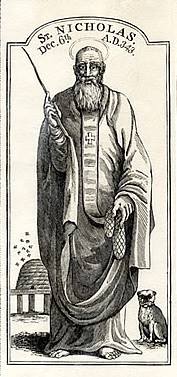
Before 1821 there were a number of Christmas gift-bringers in the USA. Dutch families, chiefly in New York, honoured Sinterklaas, their name for St Nicholas. Since no American had written about Sinterklaas, his legend spread orally and a variety of spellings referred to Santa-claw, St a. Klaus, Sandy Claw, Sancte Claus, etc. In Pennsylvania and Maryland, German immigrants had brought Belsnickle (or Pelznichol), a rough fur-clad fellow, or Kriss Kringle (or Kriss Krinkle or Krishkinkle, etc.), their version of das Christkindl or Christ Child. Some English immigrants referred to Queen Mab or other fairies but as yet, there was no Santa Claus.
This poem entitled will show how ethnically particular the St Nicholas figure was by 1810. He comes on his saint’s day (December 6), not on Christmas Eve, and his presents are clearly Dutch, especially the giant cookies in the shape of the bishop.
Oh good holy man! whom we Sancte Claus name,
The Nursery forever your praise shall proclaim;
The day of your joyful revisit returns,
When each little bosom with gratitude burns,
For the gifts which at night you so kindly impart
To the girls of your love, and the boys of your heart.
O! Come with your panniers and pockets well stow’d,
Our stockings shall help you to lighten your load,
As close by the fireside gaily they swing
While delighted we dream of the presents you bring.
Oh! Bring the bright Orange so juicy and sweet,
Bring almonds and raisins to heighten the treat;
Rich waffles and dough-nuts must not be forgot,
Nor Crullers and Oley-Cooks [cookies] fresh from the pot.
But of all these fine presents your Saintship can find,
O! Leave not the famous big Cookies behind;
Or, if in your hurry, one thing you mislay,
Let it be the Rod – and ah! keep it away.
Then holy St. Nicholas! all the long year,
Our books we will love, and our parents revere;
From naughty behavior we’ll always refrain,
In hopes that you’ll come and reward us again.